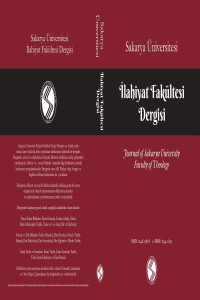Âdet Teorisinin Fıkıh ve Usûlüne Yansımaları: Namaz Vaktinin Sonunda Kâfirin İmanı Örneği
Reflections of the Theory of ʽĀdah (Custom) on Fiqh and Its Methodology: An Example of Becoming a Muslim at the End of Prayer Time
Author(s): Ahmet KaragözSubject(s): Theology and Religion, Islam studies
Published by: Sakarya üniversitesi
Keywords: Kalām; Fiqh; Fiqh Method; Theory of ʽĀdah (Custom); Theory of Khalafiyyah;
Summary/Abstract: Every science examines the personal accidents of the subject, which it determines as its subject, and the sciences differ from each other in this aspect. However, sciences offer the principles that they prove themselves through the use of other sciences. Sciences take and use the principles of other sciences that they will need, but they do not have to prove these principles in themselves. On the contrary, they entrust this proof to the sciences from which they took their principles. While examining the sources of fiqh and the method of making judgments from these sources, the method of fiqh uses the principles set forth in other sciences in the problems it encounters. One of the sciences in which the method of fiqh takes principles is kalām. Actually, the science of kalām provides principles to all other sciences with the conception of God and the world it reveals. One of these principles is the indeterminist understanding of the world, in other words, the theory of ʽādah (custom). The theory of custom, produced in the tradition of Ahl al-Sunnah Kalām, is a theory that cancels causality and makes all effects in the world peculiar to Allah. According to this theory, Allah operates the universe according to the laws of physics, which are named custom. However, this theory makes it possible for Allah, if He wills, to do extraordinary acts that are described as humanly extraordinary. Since the Fiqh and its Methodology, which is assisted by the science of kalām, is a science that is expected to judge according to the apparent, it seems to be contrary to his identity to make judgments by using the possibilities of the theory of custom. However, like the situation of a person who becomes a Muslim at the last moment of prayer, sometimes things get so tight that it becomes very difficult to judge according to outward appearance. Well, did the methodists look at the outward appearance and decide that this person is not responsible for the prayer of the aforementioned time, or did they come to a different conclusion by using the possibilities of the theory of custom
Journal: Sakarya Üniversitesi İlahiyat Fakültesi Dergisi (SAUIFD)
- Issue Year: 25/2023
- Issue No: 47
- Page Range: 153-181
- Page Count: 29
- Language: Turkish

